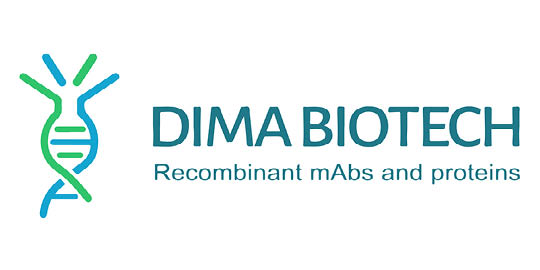
Antibodies
Antibodies represent an important tool in basic research as well as in diagnostic and more frequently in therapeutic applications. There are many methods, based on the unique binding capacity and the ability of antibodies to detect, identify or localize the specific target. Antibodies might be divided into primary antibodies, which recognize a specific target, and secondary antibodies, which bind to primary antibodies. Based on their origin, antibodies might be monoclonal, polyclonal or recombinant.
Chemically, antibodies are proteins with molecular weight around 150 kDa, carrying sugar (glycan) residues. Structurally they form a “Y” shape with 2 heavy and 2 light polypeptide chains. Every antibody has a constant domain, which is same for all antibodies of the same isotype, and a variable domain.
A monoclonal antibody is a product of a single clone of hybridoma cells and represents a homologous population in which all antibodies recognize the same antigen sequence. Polyclonal antibodies are a mixture of several antibody clones and therefore recognize or bind to more than one specific antigen sequence. Monoclonal antibodies are very specific and are valued for their low lot-to-lot variability. Polyclonal antibodies could provide a stronger signal, which can be useful when detecting low-expressed antigens or when working with proteins in their native state. A certain disadvantage of polyclonal antibodies can be the variation between produced batches and therefore poorer reproducibility, however both monoclonal and polyclonal antibodies find their place in research laboratories.
Szabo-Scandic offers a broad range of antibodies for all applications including immunoblotting (Western blot), flow cytometry, immunohistochemistry, immunocytochemistry, immunoprecipitation, enzyme immunoassays and functional assays.
- Biotinylated Anti-ACVR2B(bimagrumab biosimilar) mAbBiotinylated Anti-ACVR2B(bimagrumab biosimilar) mAbPrice is loading...Sku DMABME100228B-50Manufact. SkuBME100228B-50Packaging Unit50 µg
- Anti-PTK7(cofetuzumab biosimilar) mAbAnti-PTK7(cofetuzumab biosimilar) mAbPrice is loading...Sku DMABME100236-50Manufact. SkuBME100236-50Packaging Unit50 µg
- Anti-IL1RL2(spesolimab biosimilar) mAbAnti-IL1RL2(spesolimab biosimilar) mAbPrice is loading...Sku DMABME100235-50Manufact. SkuBME100235-50Packaging Unit50 µg
- Biotinylated Anti-IL31RA(nemolizumab biosimilar) mAbBiotinylated Anti-IL31RA(nemolizumab biosimilar) mAbPrice is loading...Sku DMABME100231B-50Manufact. SkuBME100231B-50Packaging Unit50 µg
- Biotinylated Anti-ADAM9(izeltabart biosimilar) mAbBiotinylated Anti-ADAM9(izeltabart biosimilar) mAbPrice is loading...Sku DMABME100230B-50Manufact. SkuBME100230B-50Packaging Unit50 µg
- Biotinylated Anti-CRTAM(Oxford Biotherapeutics 5A11) mAbBiotinylated Anti-CRTAM(Oxford Biotherapeutics 5A11) mAbPrice is loading...Sku DMABME100226B-50Manufact. SkuBME100226B-50Packaging Unit50 µg
- Biotinylated Anti-TNFSF15(PF-06480605 biosimilar) mAbBiotinylated Anti-TNFSF15(PF-06480605 biosimilar) mAbPrice is loading...Sku DMABME100222B-50Manufact. SkuBME100222B-50Packaging Unit50 µg
- Biotinylated Anti-IL5RA(benralizumab biosimilar) mAbBiotinylated Anti-IL5RA(benralizumab biosimilar) mAbPrice is loading...Sku DMABME100221B-50Manufact. SkuBME100221B-50Packaging Unit50 µg
- Biotinylated Anti-CD73(oleclumab biosimilar) mAbBiotinylated Anti-CD73(oleclumab biosimilar) mAbPrice is loading...Sku DMABME100217B-50Manufact. SkuBME100217B-50Packaging Unit50 µg
- Biotinylated Anti-TEM1(ontuxizumab biosimilar) mAbBiotinylated Anti-TEM1(ontuxizumab biosimilar) mAbPrice is loading...Sku DMABME100216B-50Manufact. SkuBME100216B-50Packaging Unit50 µg

 Deutsch
Deutsch




